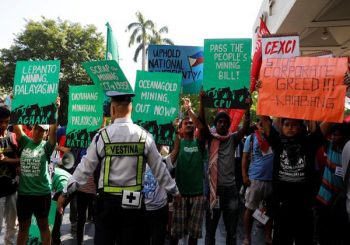Contributing Writer for Wake Up World
The population is growing. Consumerism is rampant. Greed is endemic to many portions of society. And so, our planet’s scarce resources are being plundered on a scale far beyond most of our comprehension. Around the world, communities are having their land stolen from or polluted. Against seemingly impossible odds, many individuals worldwide choose to stand up and defend their land, and our environment – but increasingly many are paying for this bravery with their lives.
Defending the Environment: More Dangerous than War?
A shocking new study published this week in Nature Sustainability reports that between 2002 and 2017, more than 1500 people around the world were murdered as retaliation for their environmental activities. This death toll is higher than the combined deaths of British and Australian soldiers in overseas war zones during this same period, and almost half as many as the total number of US soldiers killed on active service in Iraq and Afghanistan since 2001.
Last week, Global Witness, which compiles some of the data used in the report, published new figures for 2018, showing that a further 164 environmental defenders were murdered last year.
The victims since 2002 have been in more than 50 countries, with the Philippines and Columbia accounting for the most deaths in 2018. Some victims are activists, lawyers, NGO staff, park rangers or journalists; many more are ordinary community members, often indigenous peoples, desperately trying to protect their livelihoods and their land, waterways or other natural resources. Some victims are those who have resisted forced eviction. All were involved only in peaceful, non-violent protest, and the data used in the report specifically excludes deaths associated with any large-scale violence and armed conflicts in the area.
The authors of the report acknowledge that their figures are on the conservative side: the true figures are likely to be higher, because some of these crimes go unreported, particularly in Africa. Those happening in authoritarian regimes are unlikely to come to light very often.
Little Hope of Justice Against a Background of Corruption and Weak Law
It is estimated that only 10% of those responsible for these murders are ever brought to justice.
The biggest proportion of victims were protesting against mining, big agribusiness or logging. The corporate and government interests involved are huge and all-powerful, so the private security groups, state killers or contract killers involved can count on effective protection and coverups.
Unsurprisingly, the report found that there is a higher rate of environmental murders in countries where corruption and bribery are rife, and where the rule of law is weak. As Mary Menton, one of the study authors, points out, “the killers essentially know they’re not going to get caught.”
Non-Deadly Violence and Oppression is Also Rife
Alongside murder, rates of non-deadly violence, intimidation and oppression are also skyrocketing. Many environmental defenders live with daily threats and harassment, highly aware that they are putting themselves and their families in danger. Many have seen friends and family members murdered or disappeared.
The study authors state that they only considered actual physical violence; they point out that other forms of non-physical violence are also widespread, notably cultural violence and structural violence, in the form of inequality and marginalization.
Some states are increasingly trying to silence protesters and environmental defenders through the courts or via imprisonment. For example, nine environmental activists from the Persian Wildlife Heritage Foundation were arrested in Iran in early 2018 and charged with spying; one has since died in custody in suspicious circumstances.
The developed north is not immune from this problem either. No deaths have been reported here, but there is evidence that increasingly draconian laws are being introduced to curb environmental activism. Here in the UK, for example, three anti-fracking protesters were jailed for 16 months in September 2018, although their conviction was overturned a month later for being ‘manifestly excessive’. More recently, some Extinction Rebellion protesters in the UK were denied bail pending a trial set for December.
How Can We Help?
In this information age, knowledge is power, so Global Witness would like as many people as possible to draw attention to this issue by sharing their short video below:
The authors of the ‘Supply Chain of Violence’ study note that it will be vital to hold major companies in the supply chain to account. Major household brands across the world are morally responsible – knowingly or not – for the on-the-ground violence perpetrated by their suppliers lower down the chain.
Consumers must be given more transparent information to enable us to make informed decisions. Global Witness has reported on how European banks and pension funds have financed palm oil land grabs in Uganda, for example.
The last decade has shown that campaigns by NGOs, backed by consumers, can create real change – you only have to look at the relative success of the UK’s palm oil campaign for evidence of that.
To help bring attention to this issue, and to help stop the killing, please spread the word.
Article sources:
- https://www.scientificamerican.com/article/environmental-activists-have-higher-death-rates-than-some-soldiers/
- https://www.globalwitness.org/en/campaigns/environmental-activists/enemies-state/
About the author:
Nikki Harper is a spiritualist writer, astrologer, and current editor for Wake Up World.

If you've ever found value in our articles, we'd greatly appreciate your support by purchasing Mindful Meditation Techniques for Kids - A Practical Guide for Adults to Empower Kids with the Gift of Inner Peace and Resilience for Life.
In the spirit of mindfulness, we encourage you to choose the paperback version. Delve into its pages away from screen glare and notifications, allowing yourself to fully immerse in the transformative practices within. The physical book enriches the learning process and serves as a tangible commitment to mindfulness, easily shared among family and friends.
Over the past few years, Wake Up World has faced significant online censorship, impacting our financial ability to stay online. Instead of soliciting donations, we're exploring win-win solutions with our readers to remain financially viable. Moving into book publishing, we hope to secure ongoing funds to continue our mission. With over 8,500 articles published in the past 13 years, we are committed to keeping our content free and accessible to everyone, without resorting to a paywall.







